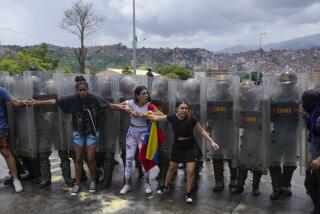Sandinista Army Must Go, Contras Reiterate at Talks : Nicaragua: But rebels leave the way open for further negotiations and pledge support for the new president.
- Share via
TEGUCIGALPA, Honduras — U.S.-backed Contras and the Nicaraguan government-elect opened their first formal demobilization talks Tuesday, and the rebels reiterated demands that the Sandinista Popular Army be dismantled as a key step to national peace in Nicaragua.
At the same time, Contra leaders left the way open for further negotiation while pledging their “moral and material support” for President-elect Violeta Barrios de Chamorro.
Chamorro, who defeated Sandinista President Daniel Ortega in elections Feb. 25, sent businessman and politician Jaime Cuadra Somarriba to Tegucigalpa on Tuesday to meet with the Contras. He was accompanied by two envoys representing Roman Catholic Cardinal Miguel Obando y Bravo: Roberto Rivas and Antonio Tijerino.
“This is the opening of a permanent process,” Cuadra said.
In a statement, the Contras said Chamorro expressed her “recognition of the valiant efforts and positive results from the activities of the Nicaraguan resistance.”
The talks began as the Sandinistas and Contras accused each other of violating a cease-fire. Sandinista officials said that fighting broke out near Matagalpa, leaving one Contra dead; Contra leaders in Tegucigalpa said their fighters were attacked near the northern Nicaraguan town of Wiwili. They also accused the Sandinista air force of bombing eight villages in the region of Nueva Segovia.
Cuadra said Tuesday’s talks avoided details on how the Contras will demobilize and instead focused on the Contras’ statement of their position.
Despite showing a more flexible attitude in recent statements, the Contras’ position and that of Chamorro’s government still appeared to be far apart. And it seemed increasingly unlikely that an agreement could be hammered out by April 25, the scheduled date of Chamorro’s inauguration.
In a press conference after the conclusion of Tuesday’s talks, the head of the Contra negotiating team, Oscar Sobalvarro, said Chamorro will have to decide details of how the Sandinista security forces are to be dismantled.
“And our role is to support her,” said Sobalvarro, who is known by his nom de guerre, Comandante Ruben. “But the army in Nicaragua is not a national army. It is a party’s army and has to disappear.”
Ortega warned on Monday that efforts to dismantle the Sandinista armed forces and replace them with Contras would lead to a national war. Chamorro, too, has taken a softer line, saying she will reduce the size of--but not eliminate--the army. A largely Sandinista officers corps would also probably remain intact, she said.
The Bush administration criticized Ortega for the remarks he made Monday. State Department spokeswoman Margaret Tutwiler said at a daily briefing:
“His most recent remarks, which talk of retaining control of the military, coupled with press reports that local Sandinista militia are being reactivated, are very much at odds with the spirit of national reconciliation and President Ortega’s own public comments.”
For his part, Ortega blasted the United States and Honduras on Tuesday for failing to help demobilize the Contras.
“Why has the government of the United States delayed ordering the transfer of humanitarian funds to the United Nations or the Organization of American States to speed up demobilization and repatriation of the Contras?” he said in a speech. “Why is Honduras delaying a decision to expel the Contras from its territory?”
The question of disarming both the Contra and Sandinista forces has emerged as one of the thorniest issues surrounding Chamorro’s new government.
More to Read
Sign up for Essential California
The most important California stories and recommendations in your inbox every morning.
You may occasionally receive promotional content from the Los Angeles Times.











